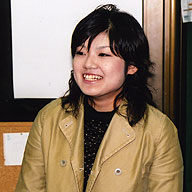An Interview with Samata Yumi
Something I Created to Make Things Easier for Myself

Q: I heard this work was done as a project for a course at your university.
SY: Correct. At university I am in the visual department, and during my second year there was an assignment to shoot a piece and screen it for the class. We were free to choose our own topics.
Q: When you filmed your father while he was alive, was it for this piece? When was it shot?
SY: I didn’t shoot the footage of my father intending to make a finished piece. I shot it without thinking much about it, one time when I’d returned home. But perhaps somehow emotionally I wanted to preserve my father’s figure in a tangible form, and to show it to someone. I shot the footage before the assignment was given.
Q: In the piece you are shooting “in order to grow up,” but are there any things that changed within you in the process of filming? Also, at the end of the piece you say “I feel refreshed, I got it out of me,” but what is your frame of mind now, after some time has passed?
SY: While making the piece I was thinking only about turning it into a finished work. I didn’t change through that process. It’s a heavy burden to have a secret (my father) that no one else can know about, and having that become known is very frightening. Rather, I felt a change within myself after the screening. Not that human relations change by divulging something you’d wanted to hide to your classmates in the form of a screening. But, I realized that regardless of whether my past and complexes are known by other people, the important thing when interacting with people is your own attitude toward others. That was a big change for me.
Q: The fast-paced and unique cutting was very impressive.
SY: I didn’t start off with a structure for combining the footage I’d already shot with the new footage I shot for the assignment. But, I consciously connected the parts that I wanted viewers to know about. Even now I don’t really have any real sense of putting together a piece from scratch. For me it feels like things the surrounding circumstances pull out from me.
Q: Were there changes in your attitude toward your father before and after making this work?
SY: More than before and after this work, there was a greater change before and after my father passed away. Until then I was filled with the feeling of disgust I’d had toward my father since I was little, and wondering why he was like that, but a different perspective opened up after he actually passed away. I wonder if I’d been able to see my father in different ways earlier, maybe my attitude and perspective toward my father while he was alive would have been different.
Q: What kind of existence does this piece have within you now?
SY: Even I think it’s a very direct and violent piece. It’s something I created to make things easier for myself. If there are people in circumstances to my own who can relate, I’d be really happy.
(Compiled by Hayashishita Sayo)
Interviewers: Hayashishita Sayo, Sato Akiko
Photography: Odashima Mayumi / Video: Morita Yu, Sonobe Mamiko / 2003-10-03 / in Yamagata
